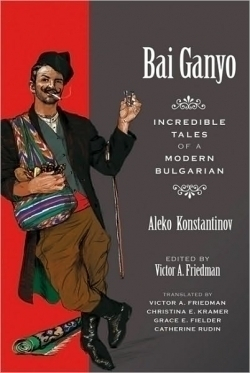Bai Ganyo
Incredible Tales of a Modern Bulgarian
- 2010 INDIES Finalist
- Finalist, Multicultural (Adult Fiction)
Bai Ganyo, Bulgarian anti-hero, is “a broad-shouldered, dark-eyed, dark-haired, swarthy man with prominent cheekbones, a turned-up mustache, and a five o’clock shadow.” He’s the title character of a series of short stories and novellas written by Aleko Konstantinov in 1894–95 and translated into English for the first time in this volume by a collective of Slavic language and linguistic academics. The stories are set up as if being told around the table at a gathering of young Bulgarian friends; each person present has a story about Bai Ganyo that can top the last, and they egg each other on––“If it’s about Bai Ganyo, don’t ask; tell!”––delighting in his misfortunes and his lucky breaks.
A rose-oil peddler by trade, Bai Ganyo travels through Europe selling the precious stuff while constantly worrying about losing the glass vials to the slippery hands of just about every person he meets. The stories and extended novellas follow his many botched schemes, ranging from getting a free meal to getting elected to public office by brutality and sinister cunning. He represents a national anxiety about the vulgarity present in late-nineteenth-century Bulgaria at a time when the country’s identity was pulled between its growing affiliation with Western Europe and its recent history of Ottoman rule. Although Bai Ganyo is a caricature of that past that so many wanted to reject, Konstantinov acknowledges his country’s inevitable kinship with the ne’er-do-well: after describing a scene at the public baths in Vienna, in which Bai Ganyo is in dire need of soap, Konstantinov writes, “But still, you can’t surprise Bulgarians with dirt: not even the more active imaginations can come up with anything more sullied than reality itself.”
The text is a part of the basic curriculum for all Bulgarian schoolchildren and Konstantinov is highly revered there; for students of Bulgarian language in North American universities, the book is almost always taught in the first year of study. Although translated by four different scholars, the result is cohesive and enlightening, though at times the perhaps over-generous footnotes take the reader out of the rhythm of Konstantinov’s humble prose. Undeniably, the book’s English translation is well overdue, and the folk tale-like stories shine.
Reviewed by
Kara Mason
Disclosure: This article is not an endorsement, but a review. The publisher of this book provided free copies of the book to have their book reviewed by a professional reviewer. No fee was paid by the publisher for this review. Foreword Reviews only recommends books that we love. Foreword Magazine, Inc. is disclosing this in accordance with the Federal Trade Commission’s 16 CFR, Part 255.

